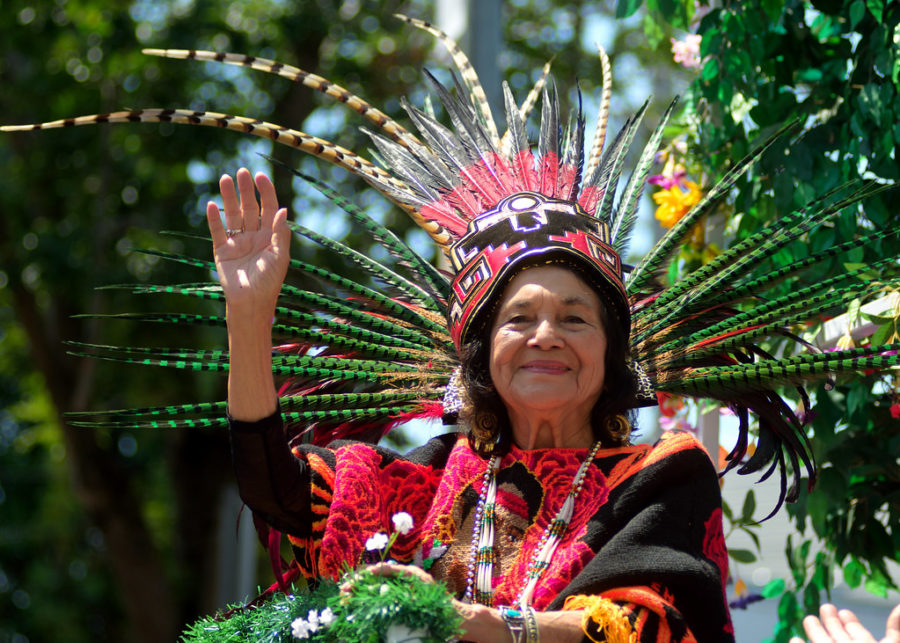Dolores Huerta’s Ongoing Fight for Hispanics, Workers, and Women – Hispanic Heritage Month
Dolores Huerta was born in 1930 to a Mexican Immigrant family in New Mexico. When she was young, her father would tell stories of union organizing. Her father worked as a labor worker (coal miner) and then later started in the migrant labor force, working in Colorado, Wyoming, and Nebraska harvesting beets. Her mother and father divorced when she was 3, and then she rarely saw her father, who stayed back in New Mexico working as a state legislator in 1938.
Her mother, Alicia Chavez, raised Dolores and her two brothers with help from their grandfather, in California. There, her mother juggled multiple different little jobs to keep up with the family’s financial needs. She saved up enough to buy a small hotel and restaurant. She allowed anyone and everyone, no matter age, race, or occupation. She even served labor workers and other low-wage employees who couldn’t afford her services for free.
Watching her mother treat everyone with respect, compassion, and empathy had a great influence on Dolores Huerta, who was soon going to revolutionize so many immigrants’ lives; many families of students here were possibly affected by her.
Discrimination and injustice displayed upon her and shown in other ways as she grew up impacted Dolores’ mindset as well. One of her school teachers would accuse her of cheating because her papers were “too well-written.” White men brutally beat up her brother for wearing a popular Latino outfit called a Zoot Suit.
Dolores earned an associate teaching degree at the University of the Pacific’s Delta College. She married Ralph Head and had two daughters with him as a student. They divorced soon after, and she tied the knot with a fellow activist, Ventura Huerta, and even though they later divorced, they had 5 children. She shortly taught school kids in the 1950s, but she decided to focus her attention on organizing farmers and farm workers to better help the many hungry farm children she saw coming to school.
Co-founding the Stockton, California chapter of the Community Service Organization (CSO) in 1955, Dolores Huerta began her activist career. They fought for economic improvements for Hispanics. She also founded the Agricultural Workers Association. She met Cesar Chavez who also had an interest in organizing farm workers, just like she did! They formed the National Farm Workers Association (NFWA) together in 1962. This was the mother organization for the United Farm Workers’ Union (UFW), which was formed 3 years later. Huerta was the UFW vice president up until 1999.
Even with all the ethnic and gender bias, Dolores helped organize the 1965 Delano strike, which had 5,000 grape workers, and was a lead negotiator for the workers’ contract that followed. She organized workers, negotiated contracts, and advocated for safer working conditions, including the riddance of toxic and harmful pesticides as just some part of her work with the UFW. She fought for unemployment and healthcare benefits for agricultural workers. Dolores was the impetus for the late 1960s nationwide table grape boycotts that led to a successful union contract by 1970.
Dolores led another consumer boycott of grapes, which resulted in the exceptional California Agricultural Labor Relations Act of 1974, allowing farm workers to form unions and bargain for better conditions and wages. She worked as a lobbyist to improve workers’ legislative representation throughout the 1970s and ‘80s. She worked to elect more Latinos and women to political office and championed women’s issues!
Dolores earned many honors, including the Eleanor Roosevelt Human Rights Award in 1998 and the Presidential Medal of Freedom in 2012. She was a board member of the Feminist Majority Foundation in 2015, the Secretary-Treasurer Emeritus of the United Farm Workers of America, and the president of the Dolores Huerta Foundation. As of 2021, she heads the Dolores Huerta Foundation, which trains community organizers and fosters community participation and civic engagement.
How she relates to BTMS
We have a fairly large percentage of Hispanic/Latinx students with that background that go here, and some of those people’s families and ancestors might have been helped and/or supported by her. She gave lots more freedom to hundreds of workers. If you have read the book Esperanza Rising by Pam Muñoz Ryan, as many of us have through the school curriculum, you got an idea of what the working conditions were back when things weren’t as fair as today.
Did you know that Vice Principal Ms. Nakkour also met Dolores Huerta in person last school year in a meeting? I don’t know about you, but as Dolores Huerta is one of my biggest role models, I was so enthralled by the idea of meeting such an amazing woman!

Who I am
Hi, I am Sanvi, I am in 8th grade. I'm 14 and I like basketball.
Why I joined Journalism
I joined Journalism because I really enjoyed it when...



